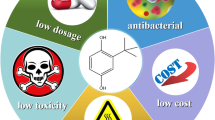Abstract
One of the hallmarks of Alzheimer's disease (AD) is the progressive degeneration of cholinergic neurons in the cerebral cortex and hippocampus. It is generally accepted that this neuronal degeneration is due to free-radical-induced damage. These free radicals attack vital structural components of the neurons. This implies that agents that reduce free radical generation could potentially delay the progression of AD. Free radical generation in the brain is assisted by the presence of iron, required by the Fenton reaction. Thus, agents that reduce iron availability for this reaction could potentially reduce free radical formation. Since non steroidal anti-inflammatory drugs (NSAIDS) have been shown to reduce the severity of AD, we investigated the possible mechanism by which indomethacin could afford neuroprotection. Our results show that indomethacin (1 mM) is able to reduce the iron-induced rise in lipid peroxidation in rat brain homogenates. In addition, our NMR data indicate that indomethacin binds the Fe2+/Fe3+ ion. This was confirmed by a study using UV/Vis spectrophotometry. The results imply that indomethacin provides a neuroprotective effect by binding to iron and thus making it unavailable for free radical production.
Similar content being viewed by others
Author information
Authors and Affiliations
Rights and permissions
About this article
Cite this article
Anoopkumar-Dukie, S., Lack, B., McPhail, K. et al. Indomethacin Reduces Lipid Peroxidation in Rat Brain Homogenate by Binding Fe2+ . Metab Brain Dis 18, 1–9 (2003). https://doi.org/10.1023/A:1021958016928
Issue Date:
DOI: https://doi.org/10.1023/A:1021958016928




